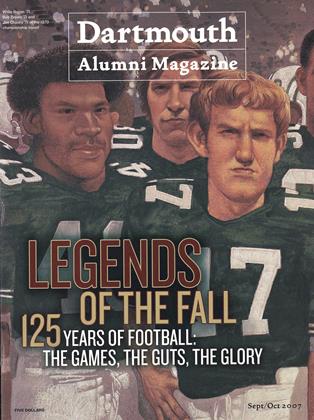A gathering of Salvador Allende Gossens Prize winners demonstrates the lasting impact of studying Latin American history at Dartmouth.
IT WAS KNOWN COLLOQUIALLY AS THE "COMMIE Award," and during the 1980s some student recipients of the Salvador Allende Gossens Prize—which honors the leftist former Chilean president and is occasionally bestowed on a graduating Dartmouth senior with a demonstrated interest in Latin America—considered scratching its name from their resumes.
That political self-consciousness seemed absent, however, on an Upper West Side rooftop in New York City during a warm Saturday night in early June, when 10 former winners, fueled by white wine and Manchego cheese, gathered to fete the awards benefactor, Bill Goodman '39.
Glasses were also raised to Marysa Navarro, the Colleges longtime history professor, who has handpicked many of the winners of the award, which was first conferred in 1976. All who gathered said they were inspired to public service because of her teaching.
As the sun dropped over the Hudson River and Spanish lyrics tumbled from stereo speakers, Navarro greeted her former students, delighted to learn that Tim Edgar '94, a former lawyer for the American Civil Liberties Union, was now with the Department of Homeland Security. "This is good, very good," said Navarro, her lightly accented voice resonating deeply. "Washington needs good people like you."
Meanwhile, Goodman, whose undergraduate days included joining striking marble workers in Barre, Vermont, said the award recognizes a progressive legacy at Dartmouth. "People have always said Dartmouth is a conservative school and that [President] Ernest Martin Hopkins, class of 1901, was a conservative man," said Goodman. "But the Orozco murals are proof that he wasn't," Goodman said.
While the Allende prize, which carries a $200 stipend, recognizes a student who has excelled in "the study of Latin American or Inter-American relations and has pursued humanitarian goals as a member of the College community," according to the history department —it also seems to portend accomplishments to come. Indeed, former winners at the party included Karin Rosemblatt '86, an author and associate history professor at Syracuse University who specializes in Latin America; Susan Braden '77, a policy director with Save the Children who focuses on war-torn countries; and New York City-based lawyer and Dartmouth trustee Jose Fernandez '77, global co-chair of the Latin American practice at Latham & Watkins.
The awards most recent recipient, Rob Karl '03, taught two history classes at Dartmouth last spring while working toward his Latin America-focused Ph.D. at Harvard. And the evenings hostess, former journalist Kim Conroy '76, covered El Salvador's civil conflict and Argentina's Dirty War, in which nearly 30,000 students, union members and political opponents were "disappeared" by the military government.
"It was the passion that Marysa had for the region that made me want to go there and make a difference," said Conroy. "I thought as a journalist one could educate North Americans about the Latin Americas' people and policies," she said.
Another guest, Goodmans son Louis '64, dean of the School of International Service at American University since 1986, lived in Santiago in the late 1960s. His experience there influenced his father's choice of a name for the Dartmouth student award. In that Pre-Allende era, poor families were struggling with one meal a day, he said. When Goodman revisited Chile after Allende took power in 1970, he observed poor Chileans enjoying a more humane three-meal regimen. "The Allende government was doing good things for the common people," said Goodman. "My father and I didn't want people to forget those times."
In those times Allende was hardly a darling of the U.S. government. President Richard Nixon, worried about American business interests, plotted to keep him from office. Even after Allende committed suicide during a 1973 military coup many conservatives considered his name to be blasphemous. So, when Bill Goodman first proposed the award to the College administration, some nervous fundraisers shied away, he said, not wanting to offend Nelson Rockefeller '30, a Republican stalwart and hefty College contributor. "But I said, 'It's either that award or give me my money back,'" Goodman said.
With the 2006 election of Michelle Bachelet, a moderate socialist, as president of Chile, world leaders appear more comfortable embracing Allendes reign. Heraldo Munoz, Chiles United Nations ambassador, who also attended the gathering, is one of them. "I'm honored to have served with him," said Munoz, who held a high-ranking cabinet position in Allendes government.
Perhaps another sign the mood has changed regarding Chiles past is that Karl is not embarrassed by his Allende award. "I don't know if people have changed or the College has changed," he said, "but it's been on my resume for four years."
The Namesake Winners ofan award named for Chile'sSalvador Allende no longerhide the fact.
C.J. Hughes is a regular contributor to DAM. He lives in New York City.
 View Full Issue
View Full Issue
More From This Issue
-
 SPORTS
SPORTSThat Championship Season
September | October 2007 By RALPH WIMBISH -
 Feature
FeatureFantastic Four
September | October 2007 By C.J. Hughes ’92 -
 Feature
FeatureThe Ultimate Dartmouth Football Player
September | October 2007 By Bruce Wood -
 Feature
FeatureUnforgettable!
September | October 2007 By HOWARD LEAVITT ’43 -
 SPORTS
SPORTSRITES OF AUTUMN
September | October 2007 By Courtesy Dartmouth College Library -
 Feature
FeatureNotebook
September | October 2007 By THOMAS AMES JR. '74
C.J. Hughes ’92
-
 Article
ArticleSongs of the Dead
May/June 2004 By C.J. Hughes ’92 -
 Article
ArticleHALLS OF NAME
Jan/Feb 2008 By C.J. Hughes ’92 -
 Article
ArticleThe Rating Game
July/August 2008 By C.J. Hughes ’92 -
 Feature
FeatureArchitectural Digest
May/June 2010 By C.J. Hughes ’92 -
 Voices in the Wilderness
Voices in the WildernessLexi Krupp '15
NOVEMBER | DECEMBER 2021 By C.J. Hughes ’92 -
 notebook
notebookTwists and Turns
JANUARY | FEBRUARY 2022 By C.J. Hughes ’92








